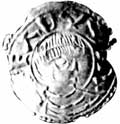Eadwig was the eldest son of King Eadmund and Ælfgifu, and the nephew of King Eadred, whom he succeeded in 955, when he was little more than 15 years old. From the very beginning of his reign Eadwig was entangled in a conflict with church leaders, who opposed the king's immoral sexual behavior. In 957 Eadwig exiled the chief architect of monastic reforms, Dunstan, but he remained under the influence of council of elders. Archbishop Oda of Canterbury separated Eadwig and his wife, Ælfgifu, on the grounds of consanguinity. This action undermined the young king's reputation. Eadwig's authority in the north was contested by the Mercians and Northumbrians, who revolted against Eadwig. In some time after 9 May 957, the kingdom was divided between Eadwig and his younger brother Eadgar, who was accepted as king in Mercia and Northumbria. Eadwig continued to govern the region south of the River Thames and died before he was 20. Later writers spoke of Eadwig as having been murdered in a conspiracy of the nobles. Biography sources: [2][3][4] |

